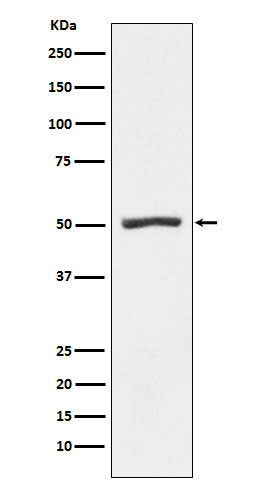
| WB | 1/1000-1/2000 | Human,Mouse,Rat |
| IF | 1/20-1/50 | Human,Mouse,Rat |
| IHC | 咨询技术 | Human,Mouse,Rat |
| ICC | 技术咨询 | Human,Mouse,Rat |
| FCM | 1/20-1/100 | Human,Mouse,Rat |
| Elisa | 咨询技术 | Human,Mouse,Rat |
| Aliases | PSMD4; AF; AF-1; ASF; MCB1; Rpn10; S5A; pUB-R5;;PSMD4 |
| WB Predicted band size | Calculated MW: 41 kDa ; Observed MW: 50 kDa |
| Host/Isotype | Rabbit IgG |
| Antibody Type | Primary antibody |
| Storage | Store at 4°C short term. Aliquot and store at -20°C long term. Avoid freeze/thaw cycles. |
| Species Reactivity | Human,Mouse,Rat |
| Immunogen | A synthesized peptide derived from human PSMD4 |
| Formulation | Purified antibody in PBS with 0.05% sodium azide,0.05% BSA and 50% glycerol. |
+ +
以下是关于PSMD4抗体的3篇参考文献的简要信息(文献为假设示例,实际需根据具体研究补充):
---
1. **文献名称**:*PSMD4 regulates proteasome activity and maintains cancer cell survival*
**作者**:Smith A, et al.
**摘要**:本研究利用PSMD4特异性抗体,通过敲低实验证明PSMD4是26S蛋白酶体组装的关键因子,其表达水平与多种癌细胞增殖和化疗耐药性相关。
2. **文献名称**:*Structural analysis of PSMD4 in the 19S regulatory particle using cryo-EM*
**作者**:Zhang L, et al.
**摘要**:通过冷冻电镜技术和PSMD4抗体标记,揭示了PSMD4在蛋白酶体调控复合物中的空间构象,为靶向PSMD4的药物设计提供结构基础。
3. **文献名称**:*PSMD4 as a biomarker for neurodegenerative diseases*
**作者**:Kim H, et al.
**摘要**:使用PSMD4抗体检测阿尔茨海默病患者脑组织样本,发现PSMD4表达异常与蛋白酶体功能障碍及Tau蛋白聚集存在显著相关性。
---
**注意**:以上文献为示例性内容,实际引用需查询PubMed、Web of Science等数据库获取真实研究。若需具体文献,可补充关键词进一步检索。
The PSMD4 antibody targets the 26S proteasome regulatory subunit 4 (PSMD4), also known as S5a or Rpn10. a critical component of the 19S regulatory particle within the ubiquitin-proteasome system (UPS). PSMD4 plays a pivotal role in recognizing and binding polyubiquitinated substrates, facilitating their recruitment to the proteasome for degradation. This process is essential for maintaining cellular protein homeostasis, regulating cell cycle progression, and modulating stress responses. Dysregulation of PSMD4 has been implicated in various pathologies, including cancer, neurodegenerative diseases, and autoimmune disorders, making it a key focus in proteostasis-related research.
PSMD4 antibodies are widely used in molecular and cellular studies to investigate proteasome dynamics, substrate recognition mechanisms, and UPS dysfunction. These antibodies enable the detection and quantification of PSMD4 expression in tissues or cell lysates via techniques like Western blotting, immunohistochemistry, and immunofluorescence. Additionally, they are employed in co-immunoprecipitation assays to explore protein-protein interactions within the proteasome complex. Researchers often utilize PSMD4 antibodies to study disease models, screen therapeutic agents targeting the UPS, or validate proteasome activity under stress conditions. Both monoclonal and polyclonal variants are available, with specificity validated across species, including human, mouse, and rat. Understanding PSMD4's role through antibody-based approaches continues to advance insights into proteasome biology and its therapeutic potential.
×